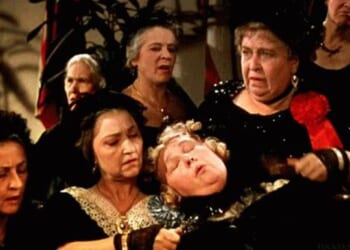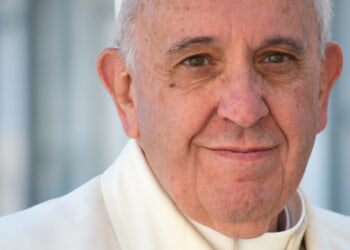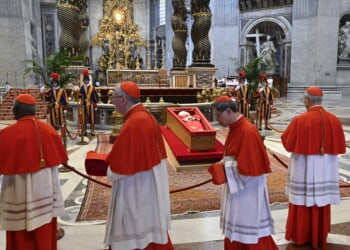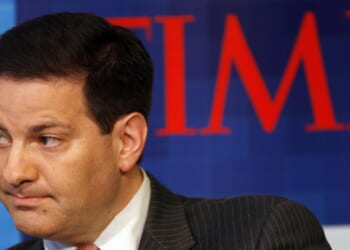On Palm Sunday in Sumy, in north-eastern Ukraine, some Ukrainian Christians were on a bus going to church, clutching willow branches, when a Russian Iskander missile exploded next to the bus. Shrapnel killed and injured bus passengers and others in the street next to the bus who had been taking advantage of the warmer weather to visit cafes and shops. It is reported that 35 are dead and 129 injured, some still in critical condition. Pensioners and children were among the victims. Donald Trump says he was told the attack was a mistake. He was told wrong. It was a “double tap” attack. Ten minutes later, there was another strike, once rescuers were on the scene.
Doubtless, at parishes across our country on Easter Sunday, we will be invited to pray for the Ukrainians, as has been regularly requested these last three years. So what specifically should we pray for on their behalf? An end to the bloodshed, of course. But also a just and sustainable peace. That requires a Ukrainian victory – the recovery of all their land. Trump certainly wants a peace deal. However, he envisages it as more of a score draw – a compromise on land. The Russians would make some concessions, such as returning the tens of thousands of kidnapped Ukrainian children. Still, Vladimir Putin would come away with something to show for the huge financial and military cost of the adventure.
Though Trump isn’t rooting for the Ukrainians, most other Western leaders are, at least in their rhetoric. If those sentiments are sincere, then why haven’t we given the Ukrainians enough backing for them to win? They have been kept on life support – enough money and supplies to stop them being overwhelmed by their larger neighbour, though not enough to push the invaders out. I wonder if our failure is due to cock up or conspiracy – perhaps both. Long delays take place before promised support is delivered. Could a cynical motive be that a long slow war is quite useful to us? Dangerous escalation is avoided while the Russian military machine is gradually weakened.
Or are western military strategists worried that a Russian defeat would prompt the overthrow of Putin and someone even more erratic taking charge? We use the convenient shorthand of “Russia”, but it is the Russian Federation with 21 republics. Of the population of 150 million, the number of ethnic Russians is around 100 million and has been falling. Ethnic minorities in the Russian Federation have been mobilised and sent to die in Ukraine in a higher ratio than the ethnic Russians. The resentments inevitably arising from that can hardly be a source of stability. Could the securocrats of NATO be anxious to avoid such uncertainties of civil war and breakaway republics?
So it’s not just Trump appeasing Putin. Yet if Putin is allowed even a partial win, the signal is terrible. The dictators in Iran and North Korea will be greatly bucked up – it would be their victory too. China would take the message that it could gobble up Taiwan. Might would be right.
Thus far, there is no prospect of it. Last month, I argued that Ukraine has more cards than Russia. Since then, the Russian losses have continued to be very substantial – if the Ukrainian claims are remotely accurate. The risk is how the Ukrainians would cope without $30 billion a year from the United States if this were cut off. Would the rest of us fill the gap? The UK is providing £5 billion this year. Given the importance of the conflict and that our annual defence spending is £70 billion it should surely have a higher priority. I can see though that flexibility in the defence budget is limited – we can’t just sack half the army (though dispensing with half the Ministry of Defence civil servants might not be such a bad idea.)
In any case, there is another source of funding available. There is £25 billion worth of frozen Russian state assets in the UK. Those funds should be handed over to the Ukrainians. There can be legal arguments over the money frozen that is owned by oligarchs. It is important for property rights and the presumption of innocence to be respected. Some of those cases may be more complicated than others. But there can be no doubt when it comes to assets from the Russian state. The invasion was illegal. The reparations due to Ukraine are immense.
Rishi Sunak wrote in The Times last month:
“Seizing the assets of another state is no small matter. But in this instance, I firmly believe that it is justified. When I was prime minister, the foreign secretary, David Cameron, made it clear repeatedly that the government saw no legal bar to the seizure of these assets. In a G7 call earlier this year, I urged the other members to adopt this position — and I do so again today.”
He added:
“Russia will undoubtedly owe Ukraine reparations for the horrific damage that it has inflicted on the country. The size of these reparations will inevitably exceed the value of Russian state assets in our financial systems and those of our allies. So, seizing these assets is a reasonable counter-measure and can be regarded as a downpayment on the reparations that Russia will clearly owe Ukraine.
“Indeed, given that about $300 billion (£230 billion) of Russian state assets is frozen — and that, as of last month, the World Bank estimated that the total cost of reconstruction and recovery is $524 billion over the next decade — it is clear the seizure of these assets will be insufficient to adequately compensate Ukraine. But seizing them and transferring them to Kyiv would be a start in this process.”
It is welcome that the UK Government and others are already using interest on some of those funds to help Ukraine. But the logic that follows is that it would be legal to hand the capital over. Sir Iain Duncan Smith has also backed this cause. As has the new Conservative MP Neil Shastri-Hurst – who writes with the experience of having been a soldier and a lawyer.
One of the most exasperating excuses for sitting on the money is that we should do nothing unless and until our allies agree. That we should wait for consensus. If that mentality had prevailed in the weeks and months before February 24th 2022 then surely Ukraine would probably have fallen. The skill and bravery of the Ukrainians would not have been enough. The UK was well ahead of other countries in providing military supplies and training which proved critical. That was very much to the credit of Boris Johnson and Ben Wallace. Had we still been constrained by the EU’s Common Foreign and Security Policy we would have still been in a meeting dithering away as Kyiv fell.
If we want other countries to do the same as us the best prospect is to show some leadership.
Pray for Ukraine? Certainly. I believe in the power of prayer. But I also believe in the power of money. Let’s back up our prayers for the Ukrainians by handing over to them the £25 billion they urgently need.


![NYC Tourist Helicopter Falls into Hudson River, Siemens Executive and Family Among Those Killed [WATCH]](https://www.right2024.com/wp-content/uploads/2025/04/NYC-Tourist-Helicopter-Falls-into-Hudson-River-Siemens-Executive-and-350x250.jpg)






![Red Sox Fan Makes the ‘Catch of the Day’ with Unconventional ‘Glove’ [WATCH]](https://www.right2024.com/wp-content/uploads/2025/04/Red-Sox-Fan-Makes-the-‘Catch-of-the-Day-with-350x250.jpg)
![Green Day’s Cringe Trump Diss Ends in Fire and Evacuation [WATCH]](https://www.right2024.com/wp-content/uploads/2025/04/Green-Days-Cringe-Trump-Diss-Ends-in-Fire-and-Evacuation-350x250.jpg)






